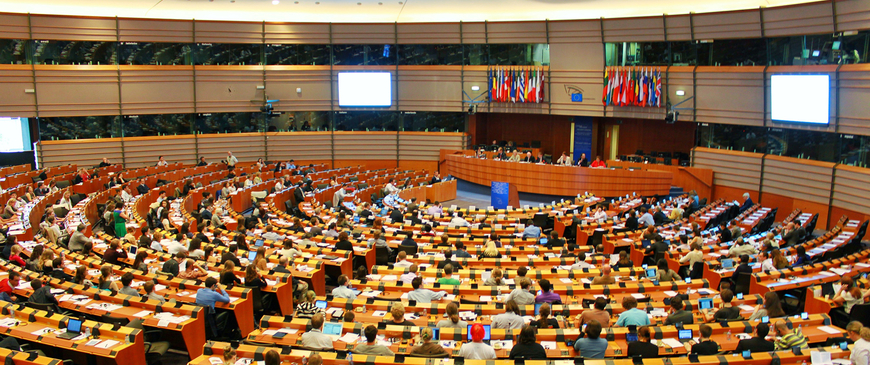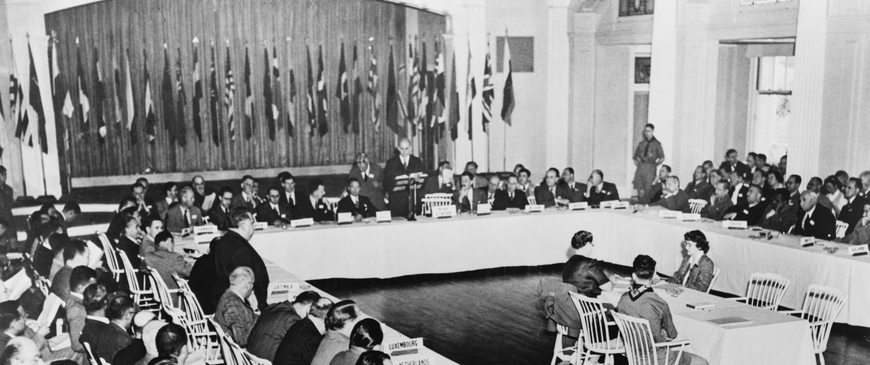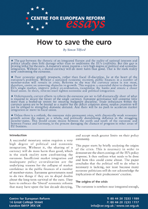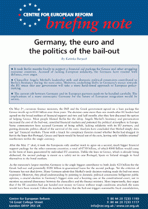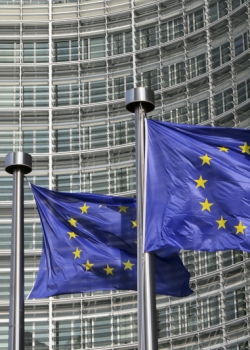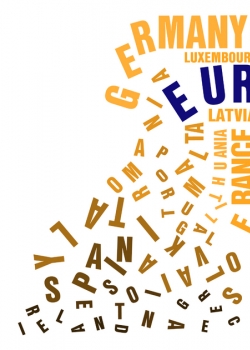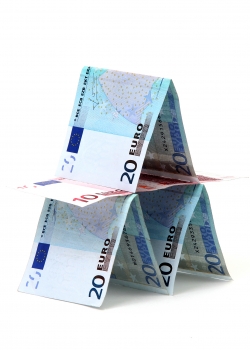Macroeconomics & the euro
Divisions remain over euro reform
08 October 2010
Europeans agree that the management of the euro must be improved to prevent future crises, or deal with them better if and when they happen.
The EU's new supervisory architecture - evolution or revolution?
01 October 2010
In early September EU finance ministers approved the Commission's proposals for reforming the EU's supervisory architecture for financial services.
The political consequences of the euro crisis
01 October 2010
The eurozone crisis is changing the way the EU works. It is reinforcing a number of trends that had already been visible over the last decade or so: a shift towards a Union in which governments are in the driving seat, large countries matter more than small ones, and more decisions are taken by subsets of member-states.
Issue 74 - 2010
24 September 2010
- The political consequences of the euro crisis, Katinka Barysch
- The midterm elections, Europe and US foreign policy, Tomas Valasek
- The EU's new supervisory architecture - evolution or revolution?, Philip Whyte
How to save the euro
14 September 2010
Current efforts to reform the eurozone are set to fall dramatically short of what is required to secure the future of the single currency. Poor economic growth prospects, rather than fiscal ill-discipline, lie at the heart of the currency union's problems.
Has Germany become Europe's locomotive?
02 September 2010
The German economy has been growing exceptionally strongly of late. In the second quarter of 2010, it expanded faster than any other economy in the G7 and faster than at any time since the country’s reunification in 1990.
A childish take on the eurozone crisis
02 August 2010
In the 1970's, a group of young professionals in Washington formed a baby-sitting co-operative. The way it worked was simple. Couples who wanted an evening out could call on other parents to look after their children.
Issue 73 - 2010
30 July 2010
- The US-China 'reset': An opportunity for the EU, Charles Grant
- The EU must support clean energy, not dirty coal, Stephen Tindale
- A childish take on the eurozone crisis, Philip Whyte
Germany, the euro and the politics of the bail-out
28 June 2010
Germany agreed to support its eurozone partners only slowly and reluctantly. Domestic political constraints and Angela Merkel's caution were partly to blame.
The eurozone retreats into a beggar-thy-neighbour cul-de-sac
14 June 2010
Almost every member of the eurozone is rushing to slash public spending. While there is no doubting the scale of the fiscal challenge, the eurozone economy is not strong enough to cope with the contractionary effects of a generalised budgetary tightening.
Eurozone governance: Why the Commission is right
04 June 2010
The collapse of market confidence sparked by the parlous state of Greece’s public finances is forcing the EU to review how the eurozone is run. This is entirely welcome.
The euro's reality gap
01 June 2010
Europe faces a critical choice between greater integration or disintegration. The gap between the rhetoric of a united Europe and the reality of national interests and politics has always dogged the EU.
Issue 72 - 2010
28 May 2010
- Will the Conservatives' charm offensive endure?, Charles Grant
- The euro's reality gap, Simon Tilford
- Russia and the West: Is the reset working?, Katinka Barysch, Tomas Valasek
Business leaders risk discrediting markets
13 May 2010
Despite their battered reputation, markets remain the best way of generating economic growth. But the market economy faces a crisis of legitimacy brought about by rising inequality and a breakdown of the relationship between risk and reward.
Closing the gap between rhetoric and reality is key to the euro's survival
10 May 2010
Europe faces a critical choice between greater integration and disintegration. The gap between the rhetoric of a united and integrated Europe and the reality of national interests and politics has always dogged Europe.
The dangers of a disgruntled Germany
07 May 2010
Germany has finally agreed to help bail out Greece. The negotiations were acrimonious and took months. Angela Merkel’s hesitation and prevarication have increased the cost of the bail-out and unsettled financial markets.
Turning Japanese?
30 April 2010
Japan has long had the highest level of public debt of any developed economy. The country’s public debt to GDP ratio is around 200 per cent of GDP, far in excess of even the EU’s worst performers.
Whatever happened to the G20?
14 April 2010
George W Bush convened the first G20 summit in Washington in November 2008, at the height of the global financial and economic crisis. At two further summits in 2009, G20 leaders pledged to co-ordinate their economic stimulus packages (as well as exit strategies), avoid protectionism, address global imbalances, triple the resources of the IMF, and work out stricter rules for banks, hedge funds and other financial players.
There can be no eurozone stability without economic growth
01 April 2010
The German government believes that tougher fiscal rules are the solution to current strains in the eurozone. No doubt such rules are necessary. But they are not enough.
Issue 71 - 2010
26 March 2010
- There can be no eurozone stability without economic growth, Simon Tilford
- Should Britain leave EU police and justice policy?, Hugo Brady
- The EU must deliver on its commitment to Pakistan, Clara Marina O'Donnell

